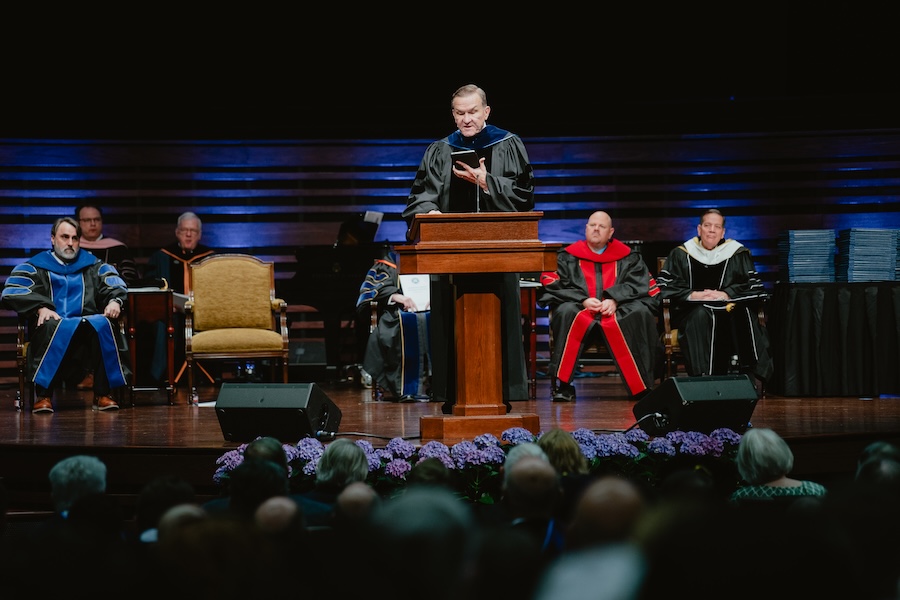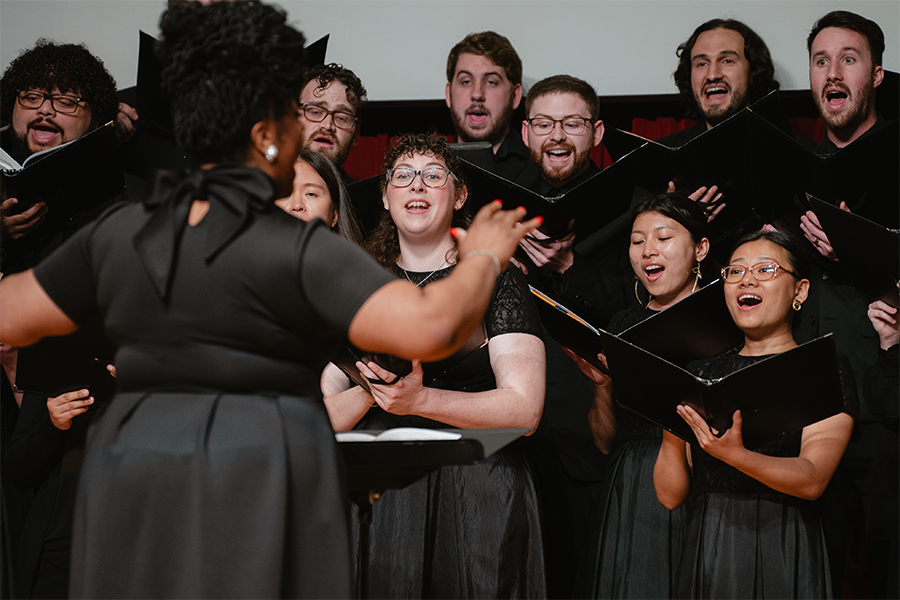Missionaries encourage students to see difficulties as ‘relative’ in light of the cross

Difficulties in life as a missionary are “relative,” Southwestern Baptist Theological Seminary and Texas Baptist College students heard from a panel of International Mission Board missionaries during the “Difficult Places” dinner Sept. 7 as part of the institution’s Global Missions Week.
In opening remarks before missionaries who serve among Central Asia, Deaf, South Asia, and North Africa and Middle East (NAME) peoples shared about the difficulties in their ministry contexts, Jerry Rankin, president emeritus of the IMB, recalled the testimony of the late Jasper McPhail, a medical doctor who studied at Southwestern Seminary and, alongside his wife, Dorothy, were the first IMB missionaries to receive a visa to serve in India.
Rankin said when he was a student at the Fort Worth seminary in the 1960s he heard McPhail, “who left a very successful, lucrative practice in cardiovascular surgery.” Rankin explained when people would ask the heart surgeon if he understood what he was sacrificing to serve on the mission field, McPhail would respond, “How can I consider it a sacrifice to go to India for Christ when He considered it a privilege to go to Calvary for me?”
“It puts it in perspective,” Rankin said before calling the missionaries to the platform. “So what if it’s difficult? So what if it’s dangerous? What difference does that make? How does that compare to what Jesus did for us?”
Andrew Bristol*, who serves among Central Asian peoples with his wife, Josie*, said there are “definitions of difficult” as there are “categories today.” He noted that Central Asia is “the least reached region of the world” and sharing the Gospel within the context is “hard” work. However, he added, “hard” is relative depending on the country within the same region.
Bristol said difficulty can be found in spiritual conditions, politics of the country, and “people’s responsiveness to the Gospel.”
“Hard is relative – it’s all hard,” Bristol noted. “When you sign up to do the work, you need to get ready for hard and that depends on your context and what you plan on doing for the Kingdom.”
Bristol added that conflict among team members can also be hard, which he cited as “the number one reason people leave the field.”
However, “leaving lost family in the States” while going to serve overseas can be difficult, said Gary Tufts, a recently retired IMB missionary who served among Deaf people in Mexico alongside his wife, Sis, for the last eight years of the 38 years of their missionary service.
Gary explained when he and his wife were preparing to leave for the mission field both family and church members asked, “Why are you going if you still have so many lost people in your family?” He said the question “was a very difficult thing” for the couple to “deal with” because his wife’s father was not a Christian. Gary added that Sis’s father became a Christian a few weeks before he passed away at 92 years old.
Oppression can also be a challenge. Gary said that difficulty can come when missionaries “go to a place to work with an oppressed people.”
“Deaf people are oppressed,” Gary explained, speaking on behalf of the entire Deaf affinity which is worldwide. “Globally they’re looked down on. They are considered ignorant and unable to learn in Muslim cultures. They cannot be a true Muslim because they cannot recite the Quran verbally.”
Sis added that in many places Deaf people are considered “an embarrassment or punishment.” Gary said when missionaries are trying to reach oppressed people, such as Deaf people, “there’s automatic suspicion.”
Sis recalled when she and Gary were called to the Deaf affinity group after decades of serving in Latin American oral contexts. They had to “quickly” learn the language – sign language. The couple was located in San Felipe, Mexico, and accompanied an indigenous man who knew the language to his village where they learned there were 17 villagers who were Deaf. She said the president of the community allowed her and her husband to share a Bible story. They realized one of the women in attendance did not know sign language and could not read or write.
During the three-hour drive home they cried, Sis remembered, adding the couple knew “we still need to share the Gospel.” Once they got home “they found pictures, found a drama to do, and took it back,” Sis said.
The couple shared different Bible stories “four or five” different times and the woman “was so happy to see us coming because she said that ‘They are coming for me!’” Sis told the students.
“She knew that our team was coming for her to share Bible stories,” Sis added. Gary said “isolation” for the Deaf community can be a challenge as their family members “don’t sign for them” and “unless they find Deaf community, they are absolutely alone and absolutely lost with absolutely no resources to steer them toward Christ.”
Sarah Joyner* is a single woman who serves in South Asia. She said, “In the midst of the difficulty, though, it is always an opportunity for the Lord to teach us something about ourselves.”
She explained while she was “very much not raised in a feminist family” but in a family “where women can do things” and “be strong” and “independent,” on the mission field she has found herself, “still being independent in my heart, but needing a local team around me and needing [South Asian] brothers and sisters and families around me.” Sarah said that it has “taught me a lot about community.”
Within the culture that she serves, Sarah said “One of the beautiful things is that I can get to a Gospel conversation in about 30 seconds.” Recognizing for many of the missionary personnel “in the room that is not the case,” Sarah explained the “hard part” within her context is “when we start talking about Jesus being ‘the only way.’”
“Usually that comes a few meetings in and we’re digging into God’s Word together,” Sarah said. “Honestly, the only hope that we have in that moment is to let the Word of the Spirit convict them.” She explained as “the foreigner” she does not want to “come in and just tell them all of their idols are wrong.” Instead, she added, “We want to exalt Jesus and point them to the Scriptures, but it really can be a frustrating thing where you leave the conversation and think, ‘You get it. You understand who Jesus is.’”
However, Sarah said, it is difficult when the realization comes that “they’re just putting Jesus on the shelf with a few of the other idols that are there.”
Jamie and Chris*, who live and serve among NAME peoples, also serve in IMB’s member care. Chris said where they live is “super modern and easy to live, but the people are so hard to the Gospel it is hard to work.”
“I think what keeps you on the ground is knowing that you are not called to save people – that’s not your job,” Chris said. “You’re called to be a mouthpiece of the Gospel – that’s what you are and that’s what keeps you on the ground.”
*Names changed for security.



